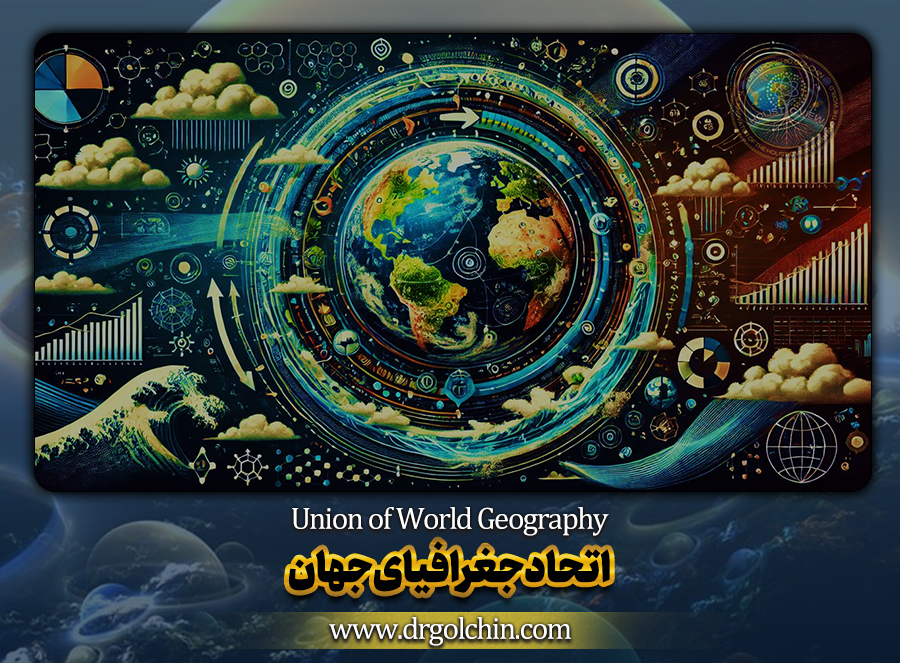اتحاد جغرافیای جهان

دکتر خورشید گلچین مبتکر دیدگاه هالستیک در ایران و جهان هستم ، معتقدم که جغرافیای همه ی کشور ها در یک هوا فضا مشترک در شبانه روز قرار دارد که در اثر چرخش کره زمین ایجاد می شود ، و این یعنی اتحاد بین جغرافیا کره زمین از دیدگاه هالستیک . دیدگاه هالستیک (کلنگر) به طور کلی به معنای نگاهی جامع به جهان و پدیدههای آن است. این دیدگاه بر این باور است که اجزای مختلف جهان در یک تعامل متقابل و پیوسته با یکدیگر هستند و برای درک واقعی هر پدیده باید آن را در چارچوب کلیتر بررسی کرد. این فلسفه به ویژه در حوزههای مختلف علمی، فرهنگی و فلسفی به کار میرود و بر اهمیت رابطه بین اجزا و کل تأکید دارد.
فهرست عناوین
- اتحاد جغرافیایی کره زمین از دیدگاه هالستیک
- چرخش زمین و تأثیرات اقلیمی
- جو مشترک زمین در اتحاد جغرافیای جهان
- اقیانوسها و جریانهای آبی
- زنجیره غذایی جهانی
- تأثیرات تغییرات اقلیمی در اتحاد جغرافیای جهان
- ارتباطات دیجیتال جهانی
- زبانها و فرهنگهای مشترک
- اقتصاد جهانی
- بحرانهای جهانی
- همکاریهای علمی و زیستمحیطی
- نتیجهگیری مقاله اتحاد جغرافیای جهان
اتحاد جغرافیایی کره زمین از دیدگاه هالستیک
از دیدگاه هالستیک، جغرافیای کره زمین نمیتواند به صورت مجزا و بدون در نظر گرفتن کل پدیدهها و نیروهایی که بر آن اثر میگذارند تحلیل شود. به عنوان مثال، تغییرات اقلیمی، چرخش زمین، جریانهای هوا، و حتی تعاملات اقتصادی و فرهنگی بین کشورها همه به یک سیستم کلانتر متصل هستند. در این چارچوب، مفهوم “اتحاد بین جغرافیا” که شما به آن اشاره کردهاید، میتواند به عنوان یکی از اساسیترین اصول هالستیک تعبیر شود. چرا که جغرافیای کشورها تنها در سایهی تأثیرات متقابل بین پدیدههای طبیعی و انسانی قابل درک است.
چرخش زمین و تأثیرات اقلیمی
چرخش زمین یکی از عوامل اصلی ایجاد شب و روز است که تمامی کشورها را تحت تأثیر قرار میدهد. این پدیده به تنهایی نشاندهنده اتحاد در جغرافیای کره زمین است؛ چرا که همه کشورها در یک چرخه زمانی شبانهروزی مشترک قرار دارند. این چرخه نه تنها بر الگوهای زندگی انسانها بلکه بر ساختارهای اقتصادی، فرهنگی و زیستمحیطی کشورها نیز تأثیر دارد.
جو مشترک زمین در اتحاد جغرافیای جهان
جو زمین یکی دیگر از عناصر کلیدی اتحاد جغرافیایی است. هوای مشترک که تمام سیاره را فرا گرفته، بدون در نظر گرفتن مرزهای سیاسی و جغرافیایی، برای بقای تمام موجودات زنده لازم است. از دیدگاه هالستیک، نمیتوان جغرافیا را بدون در نظر گرفتن این پدیده بررسی کرد؛ چرا که تغییرات در یک منطقه، به سرعت تأثیر خود را در سایر نقاط نشان میدهد.
اقیانوسها و جریانهای آبی
اقیانوسها نیز یکی از عوامل متحد کننده در جغرافیای کره زمین هستند. جریانهای آبی که بین قارهها حرکت میکنند، تأثیرات مهمی بر اقلیم، اقتصاد و حتی فرهنگ جوامع مختلف دارند. به عنوان مثال، جریان گلف استریم در اقیانوس اطلس تأثیر عمیقی بر آب و هوای اروپا و آمریکا دارد و نمونهای از تعامل بین مناطق مختلف زمین است.
زنجیره غذایی جهانی
از دیدگاه هالستیک، منابع غذایی نیز نشاندهنده تعامل و اتحاد جغرافیایی هستند. بسیاری از محصولات کشاورزی در یک منطقه تولید و به سایر مناطق صادر میشوند. این تعاملات غذایی نشاندهنده پیوندهای عمیق بین کشورها و تأثیرات متقابل آنها در زنجیره تأمین جهانی است.
تأثیرات تغییرات اقلیمی در اتحاد جغرافیای جهان
تغییرات اقلیمی یک پدیده جهانی است که بر جغرافیای همه کشورها تأثیر میگذارد. افزایش دمای کره زمین، ذوب شدن یخهای قطبی و بالا آمدن سطح آب دریاها نمونههایی از تأثیرات این پدیده هستند که هیچ کشوری از آن مصون نیست. این مسأله به خوبی نشان میدهد که تمامی کشورها در یک سیستم جهانی به هم پیوسته قرار دارند.
ارتباطات دیجیتال جهانی
در دنیای امروز، تکنولوژی ارتباطات نقش مهمی در اتحاد جغرافیایی دارد. اینترنت و فناوریهای ارتباطی به افراد امکان میدهند که بدون در نظر گرفتن مرزهای جغرافیایی با یکدیگر در ارتباط باشند. این پدیده نشان میدهد که چگونه انسانها میتوانند از محدودیتهای جغرافیایی فراتر بروند و یک جامعه جهانی را تشکیل دهند.
زبانها و فرهنگهای مشترک
اگرچه هر کشور زبان و فرهنگ خود را دارد، اما بسیاری از زبانها و فرهنگها در طول زمان تحت تأثیر تعاملات جهانی تغییر کرده و به هم پیوستهاند. به عنوان مثال، انگلیسی به عنوان زبان بینالمللی، در بسیاری از کشورها به کار میرود و فرهنگهای مختلف از یکدیگر تأثیر میپذیرند.
اقتصاد جهانی
اقتصاد جهانی یکی دیگر از نشانههای اتحاد جغرافیایی است. کشورها به طور مستقیم و غیرمستقیم به یکدیگر وابسته هستند و تغییرات در یک اقتصاد میتواند تأثیرات عمیقی بر سایر اقتصادها داشته باشد. از دیدگاه هالستیک، نمیتوان اقتصاد یک کشور را بدون در نظر گرفتن ارتباطات جهانی تحلیل کرد.
بحرانهای جهانی
بحرانهایی مانند همهگیری کووید-19 نمونه دیگری از اتحاد جغرافیایی کشورهاست. این ویروس بدون توجه به مرزهای جغرافیایی و سیاسی در سراسر جهان گسترش یافت و نشان داد که تمامی انسانها در یک سیستم به هم پیوسته زندگی میکنند.
همکاریهای علمی و زیستمحیطی
همکاریهای علمی بین کشورها، به ویژه در زمینههایی مانند تحقیقات زیستمحیطی و هواشناسی، یکی دیگر از نشانههای اتحاد جغرافیایی است. محققان از سراسر جهان برای درک بهتر پدیدههایی مانند تغییرات اقلیمی و حفاظت از محیط زیست همکاری میکنند.
نتیجهگیری مقاله اتحاد جغرافیای جهان
از دیدگاه هالستیک، جغرافیای کره زمین یک سیستم پیچیده و به هم پیوسته است که در آن تمامی کشورها، جوامع و پدیدههای طبیعی در تعامل با یکدیگر قرار دارند. چرخش زمین و پدیدههای جغرافیایی نه تنها نشاندهنده تعاملات طبیعی هستند، بلکه تعاملات فرهنگی، اقتصادی و اجتماعی نیز به شدت تحت تأثیر این تعاملات قرار دارند. به این ترتیب، اتحاد بین جغرافیا به عنوان یک اصل اساسی در دیدگاه هالستیک قابل تفسیر است و نشان میدهد که هیچ کشوری یا منطقهای نمیتواند به تنهایی و بدون در نظر گرفتن تأثیرات متقابل با سایر مناطق جهان عمل کند.
Dr. Khurshid Golchin is the originator of the holistic view in Iran and the world. I believe that the geography of all countries is in a common air and space day and night, which is created by the rotation of the earth, and this means the union between the geography of the earth from a holistic point of view.
Holistic Analysis of Earth’s Geographical Unity
The holistic perspective emphasizes a comprehensive view of the world and its phenomena, asserting that all parts of the world are interconnected and influence each other. This approach believes that to truly understand any phenomenon, it must be examined within a broader context. Holism is widely applied in various scientific, cultural, and philosophical domains, stressing the importance of relationships between parts and the whole.
The Geographical Unity of Earth from a Holistic Perspective
From a holistic perspective, the geography of the Earth cannot be understood in isolation without considering the broader forces and phenomena affecting it. For example, climate change, Earth’s rotation, air currents, and even economic and cultural interactions between countries are all interconnected within a larger system. In this context, the concept of “unity between geographies,” which you mentioned, can be interpreted as a fundamental principle of holism. Geographies of countries can only be understood in light of mutual interactions between natural and human phenomena.
- Earth’s Rotation and Climatic Impacts
Earth’s rotation is one of the main factors that create day and night, impacting all countries. This phenomenon alone illustrates the unity of Earth’s geography, as all countries experience the same diurnal cycle. This cycle influences not only human lifestyles but also economic, cultural, and environmental structures globally.
- Earth’s Shared Atmosphere
Earth’s atmosphere is another key element of geographical unity. The air enveloping the planet is shared by all, regardless of political or geographical boundaries, and is essential for the survival of all living beings. From a holistic perspective, geography cannot be analyzed without considering this phenomenon, as changes in one region quickly impact others.
- Oceans and Water Currents
Oceans are also a unifying force in Earth’s geography. Ocean currents that flow between continents significantly affect climate, economy, and even cultures. For instance, the Gulf Stream in the Atlantic Ocean has a profound effect on the weather patterns in Europe and North America, illustrating the interaction between different parts of the Earth.
- Global Food Chain
From a holistic viewpoint, food resources also demonstrate geographical interdependence. Many agricultural products are produced in one region and exported to others. This global food interaction highlights the deep connections between countries and how they influence one another within the global supply chain.
- Climate Change Impacts
Climate change is a global phenomenon that affects the geography of all countries. Rising global temperatures, melting polar ice caps, and rising sea levels are examples of impacts that no country is immune to. This issue clearly demonstrates that all nations are part of an interconnected global system.
- Global Digital Communications
In today’s world, communication technologies play a vital role in geographical unity. The internet and communication technologies allow people to interact without considering geographical boundaries. This phenomenon shows how humans can transcend geographical limitations and form a global community.
- Shared Languages and Cultures
While each country has its own language and culture, many languages and cultures have become interconnected and influenced by global interactions over time. For example, English is widely spoken as an international language, and various cultures across the globe continuously influence one another.
- Global Economy
The global economy is another indicator of geographical unity. Countries are directly and indirectly dependent on each other, and changes in one economy can deeply affect others. From a holistic viewpoint, the economy of a single country cannot be analyzed without considering its global connections.
- Global Crises
Global crises like the COVID-19 pandemic are another example of geographical unity. The virus spread worldwide, disregarding geographical and political borders, demonstrating that all human beings live in an interconnected system.
- Scientific and Environmental Cooperation
International scientific collaborations, especially in areas like environmental and meteorological research, also show geographical unity. Researchers across the globe work together to better understand phenomena like climate change and environmental preservation.
Conclusion
From a holistic perspective, Earth’s geography is a complex, interconnected system where all countries, societies, and natural phenomena interact with one another. Earth’s rotation and geographical phenomena not only illustrate natural interactions but also show how cultural, economic, and social interactions are deeply influenced by these factors. Therefore, unity in geography is a fundamental principle in the holistic view, demonstrating that no country or region can act in isolation without considering the mutual influence it shares with other parts of the world.





